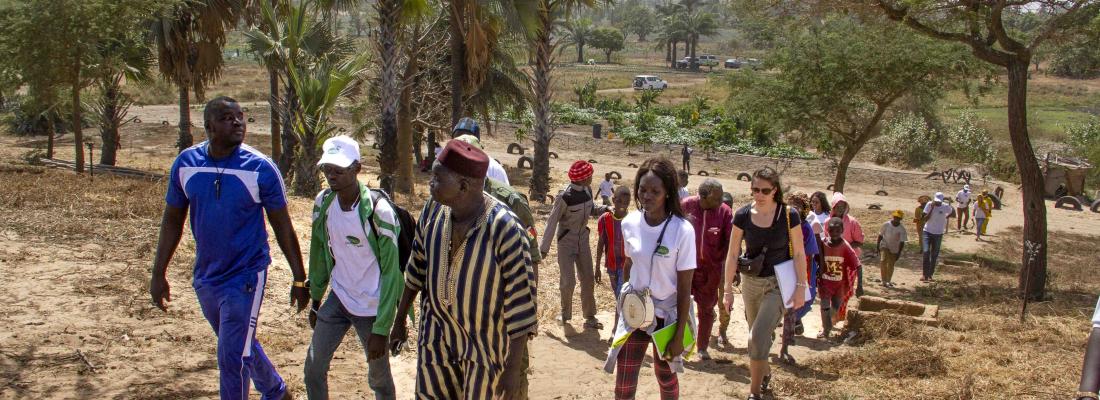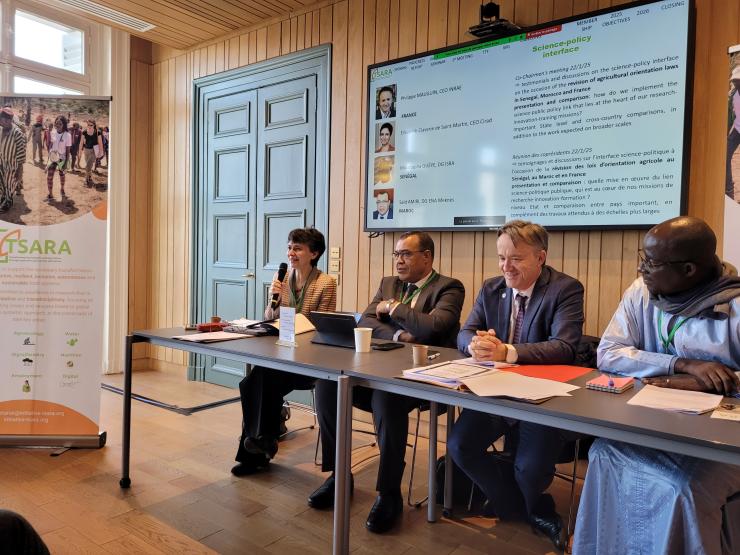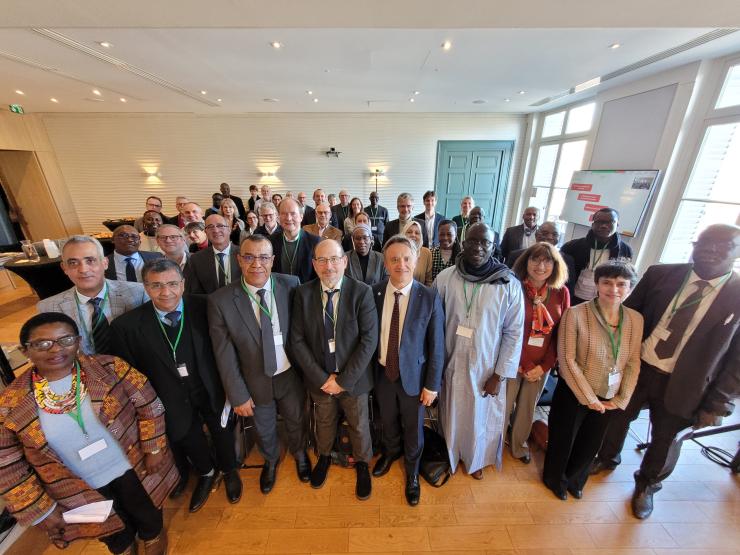Food, Global Health Reading time 2 min
The TSARA initiative: collaborative research promoting sustainable food systems in Africa and Europe continues to expand
Published on 06 March 2025

TSARA's 3rd General Assembly offered the perfect opportunity to assess progress made in the implementation of TSARA's action plan, to discuss the scientific contribution to the revision of agricultural laws in France, Senegal and Morocco, and to discuss the priorities for 2025. Furthermore, six new associate members have been welcomed to the initiative and the co-presidency has moved institutions.
“In a context of climate change, and taking into account the monumental challenges that Africa and Europe currently face in the fields of agriculture, food, and the environment, the TSARA initiative demonstrates our capacity to work on key issues together. At the interface between science and public policy, the initiative is a beacon of hope, and we can actually see how agroecology is developing on the field”, expressed a delighted Philippe Mauguin, Chairman and CEO of INRAE, as he handed over the co-presidency of the TSARA initiative to the École nationale d'agriculture (ENA) in Meknès and CIRAD.
“This initiative is born in a context where food security, the agroecological transition and climate resilience have become urgent issues. The contribution of scientific research to future national agricultural legislation is essential. At a time when food security has become a critical issue, it's very exciting to see this initiative evolve. TSARA can contribute enormously to the dialogue between Europe and Africa”, stated Elisabeth Claverie de Saint Martin, CEO of CIRAD.
The Director of ENA Meknès, Saïd Amiri, added that “It is an honour to be taking over the presidency—alongside CIRAD—of this major initiative to transform agricultural and food systems in Africa, following the seminar we organised last December on the capacity of science to transform agriculture, which saw the participation of 17 institutions from 11 countries. Our institution is fully committed to training young farmers in agroecology, with the creation of a new training course and a national centre for innovation in agroecology, part of the Ministry of Agriculture's Generation Green Strategy”. This strategy aims to transform the agricultural sector in a fair and effective manner, by improving the lives of small-scale producers, encouraging the development of an agricultural middle class, promoting farming practices that respect the environment and are adapted to climate change—all with the aid of digital technologies—with the objective of connecting 2 million farmers with agricultural services by 2030. One million hectares have already been made available by the government to help farmers set up businesses.
Morocco, this year’s guest of honour at the Paris International Agricultural Show, participates in the TSARA initiative through the ENA in Meknès and the École nationale forestière d'ingénieurs, a brand-new member of the initiative.
Two flagship food projects and two new European projects for the Mediterranean
The MAHDIA project—one of TSARA's headline projects—focuses on the interplay between water, food and the agroecological transition, bringing together scientific teams from Morocco, Tunisia, Senegal and France. The project is funded by the French Ministry for Europe and Foreign Affairs. It counts among its members the Institut national agronomique de Tunisie (INAT), ENA Meknès, the Institut sénégalais de recherches agricoles (ISRA), CIHEAM Montpellier, CIRAD, INRAE and Institut Agro Montpellier.
Another flagship project of the initiative, with partners from South Africa, Senegal and France, is the FAMA project—Food And Microbiota in Africa—which focuses on nutrition, everything from the microbiome to public policy, including consumer and food environment, and involving a wide range of players from research, civil society and the private sector. The project is supported by the French Embassy in South Africa, with funding from the French Ministry for Europe and Foreign Affairs, and in collaboration with CIRAD, the NARES, the University of Pretoria, the University of the Western Cape, the African Research Council (ARC), the Council for Scientific and Industrialised Research (CSIR) and the LARTES-IFAN laboratory at Cheick Anta Diop University, as well as the NGO Siyazisisa Trust and the private group Puratos.
In addition to these 2 key projects, €1.3 million has been allocated to start-up projects between 2022 and 2025, focusing on the 9 TSARA themes. In 2025, the call for projects focused on nutrition, processing and circularity.
In 2025, TSARA enters a new phase with the launch of the first 2 European projects for the Mediterranean: MORFeuS will focus on territorial approaches and decision-making tools for resilience (Algeria, France, Morocco, Portugal, Tunisia) and AQUEDUCT, on water accounting methods in crisis situations, climate change and external shocks (Spain, France, Italy, Morocco, Tunisia).
A new working group dedicated to the science-policy interface with the aim of contributing to agricultural guideline laws
In addition, against a backdrop of agricultural reforms in Africa and Europe, the initiative has agreed to set up a working group dedicated to the science-policy interface. This group will consolidate TSARA's scientific contributions to public agricultural policies on issues such as food security, agricultural employment and the management of common resources.
“Agriculture is an essential lever for creating sustainable jobs, particularly for young people. The conference we organised at the end of 2024 in Dakar brought to light concrete guidelines for the new agro-sylvo-pastoral orientation law. By facilitating the interplay between science, policy and fieldwork, TSARA supports these reforms and implements practical solutions to modernise the sector and make agricultural occupations more attractive”, emphasised Moustapha Gueye, CEO of the Institut sénégalais de recherche agricole (ISRA) and outgoing co-chairman of TSARA.
In terms of mobilising stakeholders, TSARA's distinctive approach relies on high-leverage actions, such as this international conference on the challenges and future of jobs in agriculture, as well as co-organised webinars on other areas like soils and local animal breeds, among others.
TSARA’s six new members
TSARA is continuing to expand its reach across Europe and English-speaking African countries with 6 new members:
- Addis Ababa University (Ethiopia)
- CIHEAM Montpellier (France)
- ENFI, École nationale forestière d'ingénieurs (Morocco)
- IRD, Institut de recherche pour le développement (France)
- NMAIST, Nelson Mandela African Institution of Science and Technology (Tanzania)
- Obafemi Awolowo University (Nigeria)
List of the 26 other member institutions
ARC, South Africa
University of Pretoria, South Africa
University of Western Cape, South Africa
University of Abomey Calavi, Benin
INERA, Burkina Faso
CIRDES*, Burkina Faso
IRAD, Cameroon
INPHB/ESA, Ivory Coast
ARC, Egypt
ICIPE, Kenya
University of Antananarivo, Madagascar
FOFIFA, Madagascar
IER, Mali
ENA Meknès, Morocco
CILSS*, Regional - West Africa
UCAD, Senegal
ISRA, Senegal
Gaston Berger University, Senegal
UCAR, Tunisia
IRESA, Tunisia
University of Zimbabwe, Zimbabwe
INRAE, France
CIRAD, France
Institut Agro, France
AgroParisTech, France
*Regional organisations on the African continent


